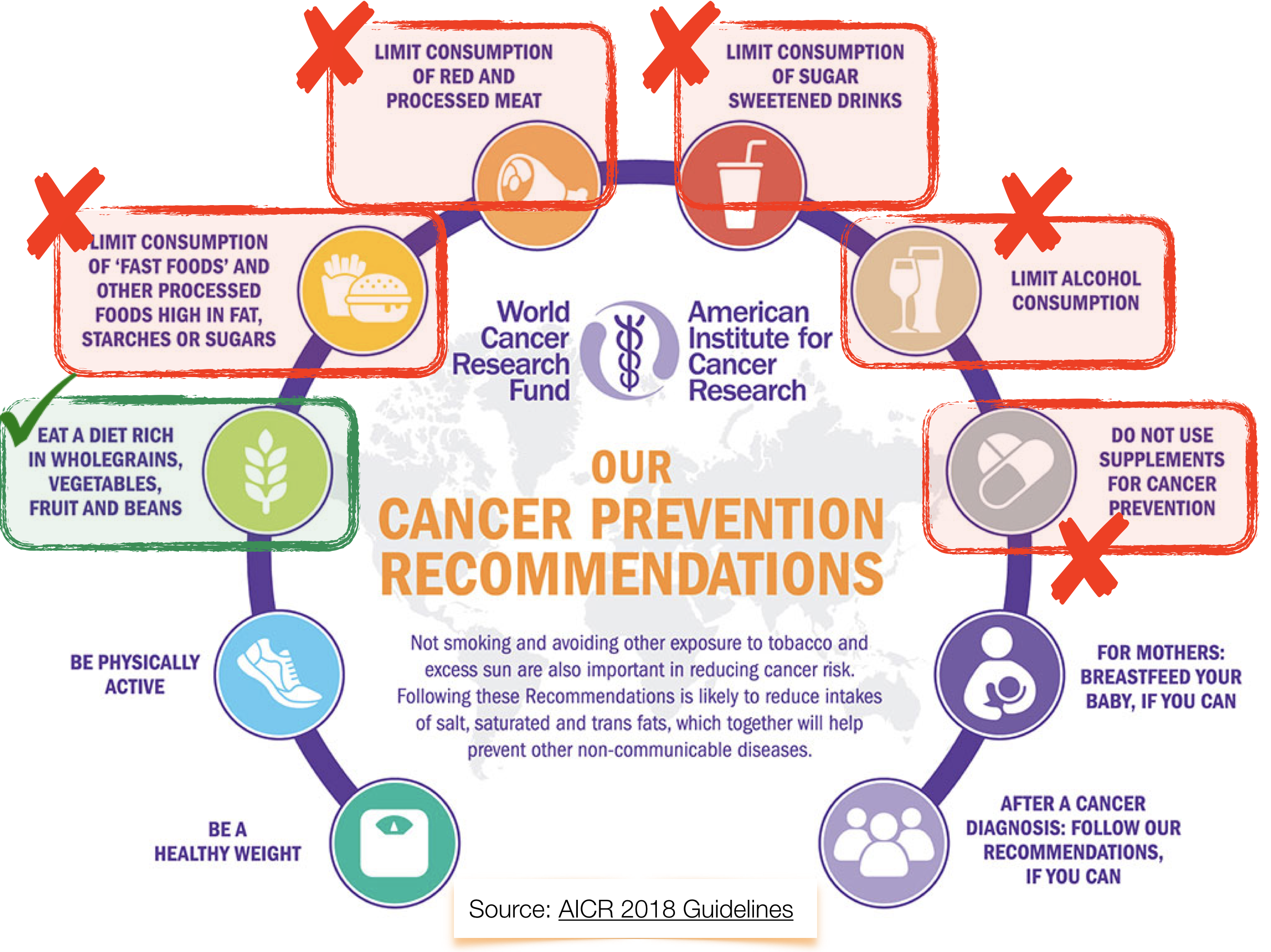In addition to the 10 Recommendations, notice the text in the center of the infopic: "Not smoking and avoiding other exposure to tobacco and excess sun are also important in reducing cancer risk. Following these Recommendations is likely to reduce intakes of salt, saturated and trans fats, which together will help prevent other non-communicable diseases."
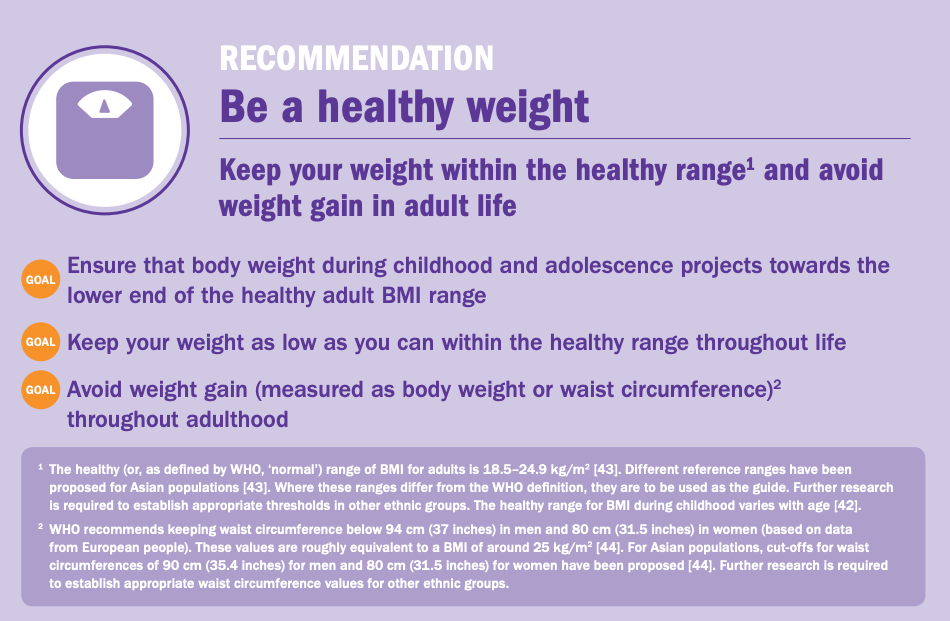
Source: WCRF - AICR Recommendations (2018)
Recommendation 1: BE A HEALTHY WEIGHT
"Keep your weight within the healthy range and avoid weight gain in adult life.""Next to not smoking, maintaining a healthy weight is the most important thing you can do to reduce your risk of cancer. Aim to be at the lower end of the healthy Body Mass Index (BMI) range.
Body fat doesn't just sit there on our waists - it acts like a 'hormone pump' releasing insulin, estrogen and other hormones into the bloodstream, which can spur cancer growth. See Recommendations 2 and 3 for strategies for weight management."
Source: Summary of Cancer Prevention Recommendations (2018).
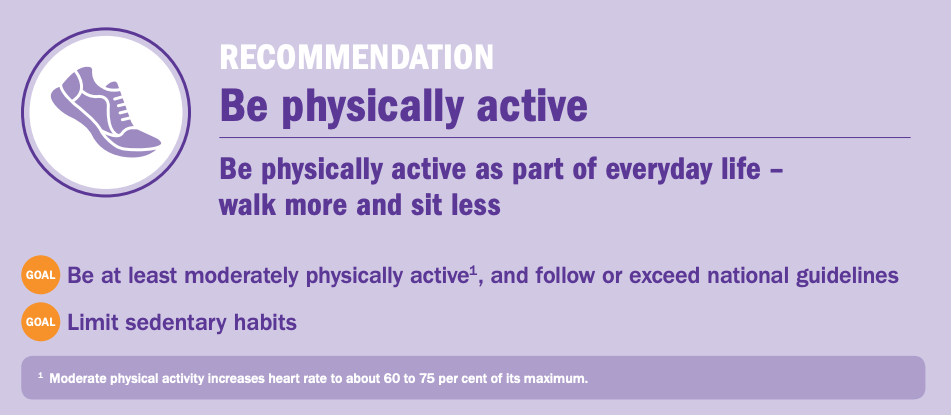
Source: WCRF - AICR Recommendations (2018)
Recommendation 2: BE PHYSICALLY ACTIVE
"Be physically active as part of everyday life — walk more and sit less.""Physical activity in any form helps to lower cancer risk. Aim to build more activity, like brisk walking, into your daily routine. Physical activity also helps to prevent weight gain, overweight and obesity, which increase risk of cancer.
Scientists recommend that we aim for a minimum of 150 minutes of moderate, or 75 minutes of vigorous, physical activity a week. For cancer prevention and weight control, higher levels of activity provide even more benefit. Work toward achieving 45 to 60 minutes moderate-intensity physical activity daily. Going beyond 60 minutes daily provides additional health benefits.
Emerging research is shows that sedentary behaviors - e.g. sitting at a computer, watching tv, - increase risk for weight gain, overweight and obesity. Break up your day by getting up and walking around a few minutes every hour."
Source: Summary of Cancer Prevention Recommendations (2018).
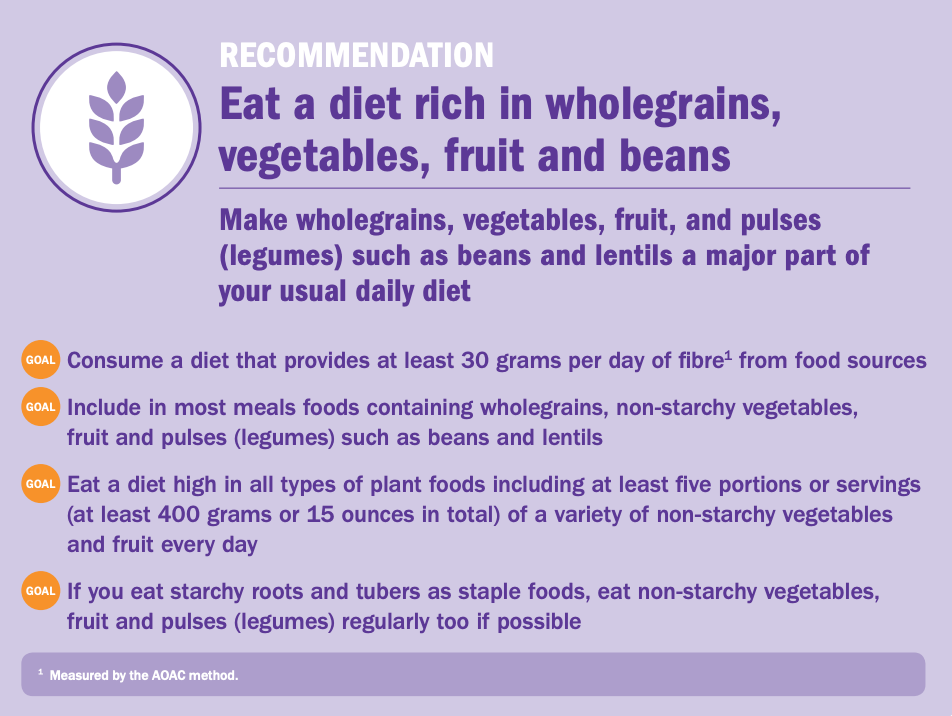
Source: WCRF - AICR Recommendations (2018)
Recommendation 3: EAT A DIET RICH IN WHOLE GRAINS, VEGETABLES, FRUITS AND BEANS
"Make whole grains, vegetables, fruits and pulses (legumes) such as beans and lentils a major part of your usual daily diet."Basing our diets around plant foods (like vegetables, fruits, whole grains and beans), which contain fiber and other nutrients, can reduce our risk of cancer.
For good health, AICR recommends that we base all of our meals on plant foods. When preparing a meal, aim to fill at least two-thirds of your plate with vegetables, fruits, whole grains and beans.
As well as containing vitamins and minerals, plant foods are good sources of substances called phytochemicals. These are biologically active compounds, which can help to protect cells in the body from damage that can lead to cancer.
Plant foods can also help us to maintain a healthy weight because many of them are lower in energy density (calories).
Source: Summary of Cancer Prevention Recommendations (2018).
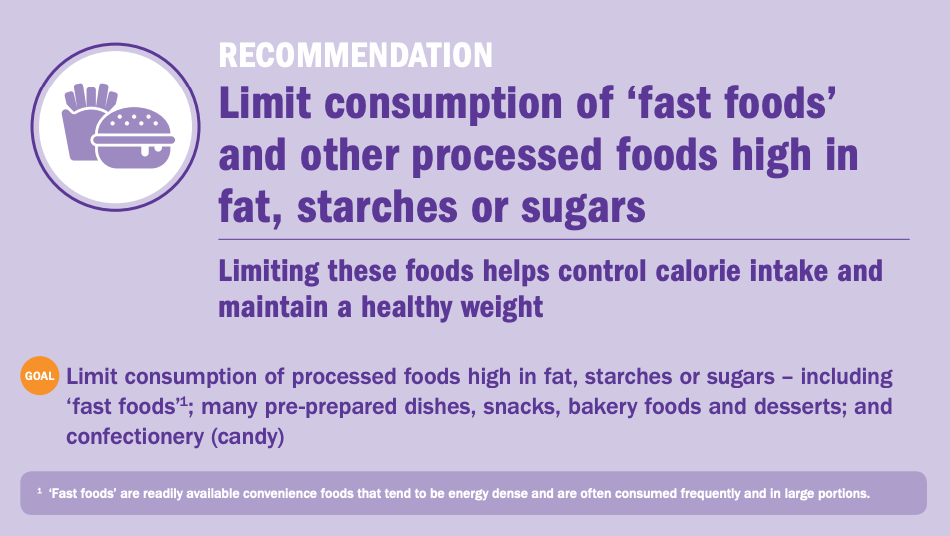
Source: WCRF - AICR Recommendations (2018)
Recommendation 4: LIMIT CONSUMPTION OF "FAST FOODS" AND OTHER PROCESSED FOODS HIGH IN FAT, STARCHES OR SUGARS
Limiting these foods helps control calorie intake and maintain a healthy weight.There is strong evidence that consuming "fast-foods" and a "Western-type" diet are causes of weight gain, overweight and obesity, which are linked to 12 cancers.
Glycemic load also increases risk for endometrial cancer.
Source: Summary of Cancer Prevention Recommendations (2018).
Comments: I was wondering: why does the guideline use the phrase 'limit the consumption of …' instead of saying something stronger like 'do not consume …'? Is there something beneficial in these foods that we are being asked to limit?
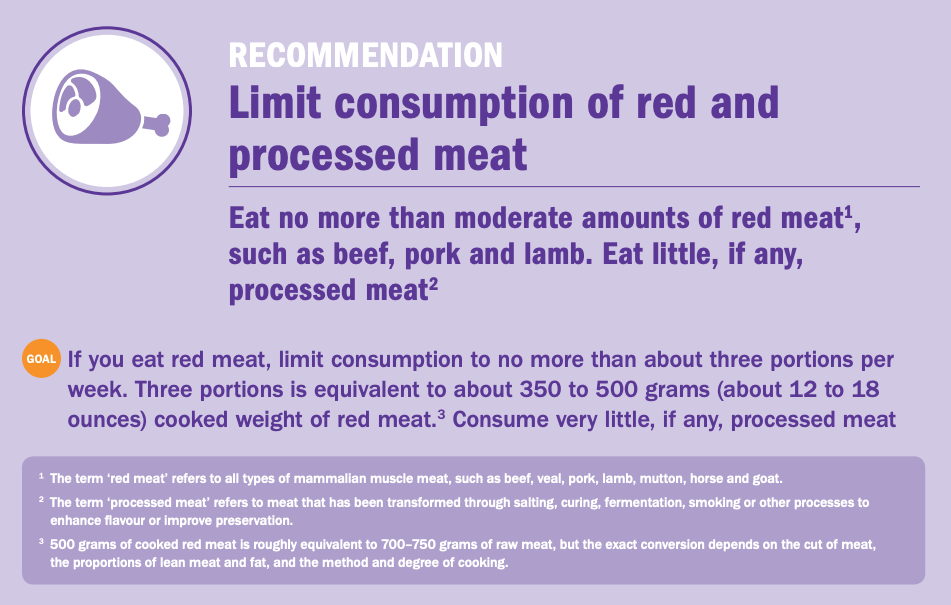
Source: WCRF - AICR Recommendations (2018)
Recommendation 5: LIMIT CONSUMPTION OF RED AND PROCESSED MEAT
Eat no more than moderate amounts of red meat, such as beef, pork and lamb. Eat little, if any, processed meat.The evidence that red meat (beef, pork and lamb) is a cause of colorectal cancer is convincing. Studies show, however, that we can consume modest amounts — 12 to 18 ounces (cooked) per week — without a measurable increase in colorectal cancer risk.
But when it comes to processed meat (ham, bacon, salami, hot dogs, sausages) the evidence is just as convincing, and cancer risk begins to increase with even very low consumption.
This is why the expert panel advises limiting red meat and avoiding processed meat.
Source: Summary of Cancer Prevention Recommendations (2018).
Comments: I was wondering: why does the guideline use the phrase 'limit consumption of …' instead of saying something stronger like 'do not consume …'? Is there something beneficial in these foods that we are being asked to limit? Processed meat is known to be an IACR Group 1 Carcinogen! In view of that, shouldn't we use a stronger phrase like 'do not consume processed meat'?
Dr Greger - 2020 Dietary Guidelines Advisory Committee (3 mins, 2020) is an appeal by Dr Greger, requesting that the US Dietary Guidelines for 2020 must inform the public of the dangers of processed meat.
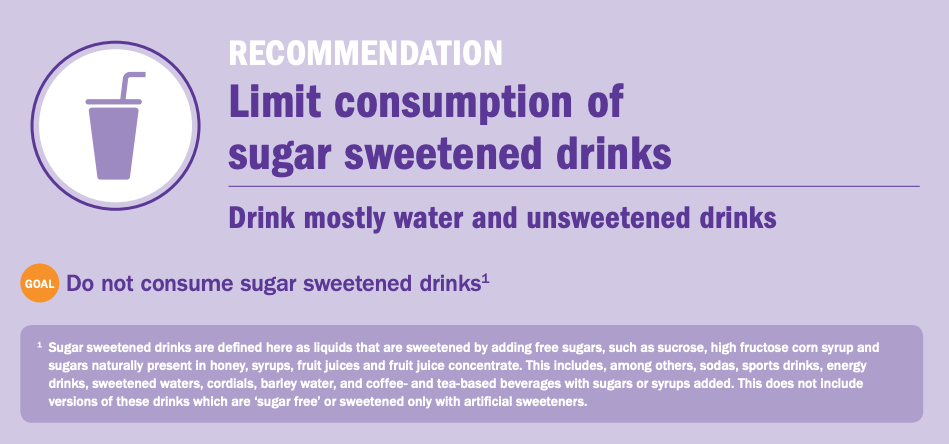
Source: WCRF - AICR Recommendations (2018)
Recommendation 6: LIMIT CONSUMPTION OF SUGAR-SWEETENED DRINKS
Drink mostly water and unsweetened drinks. There is strong evidence that consuming sugar-sweetened beverages causes weight gain, overweight and obesity, linked to 12 cancers.Sugar-sweetened beverages provide energy, but may not influence appetite in the same way as food does and can promote overconsumption of calories.
Source: Summary of Cancer Prevention Recommendations (2018).
Comments: I was wondering: why does the guideline use the phrase 'limit consumption of …' instead of saying something stronger like 'do not consume …'? Is there something beneficial in these foods that we are being asked to limit?

Source: WCRF - AICR Recommendations (2018)
Recommendation 7: LIMIT ALCOHOL CONSUMPTION
For cancer prevention, it's best not to drink alcohol.Previous research has shown that modest amounts of alcohol may have a protective effect against coronary heart disease.
But for cancer prevention, the evidence is clear and convincing: alcohol in any form is a potent carcinogen. It's linked to 6 different cancers. The best advice for those concerned about cancer is not to drink.
If you do choose to drink alcohol, however, limit your consumption to one drink for women and two for men per day.
Source: Summary of Cancer Prevention Recommendations (2018).
Comments: I was wondering: why does the guideline use the phrase 'limit consumption of …' instead of saying something stronger like 'do not consume …'? Is there something beneficial in alcohols that we are being asked to limit? Alcohol is known to be an IACR Group 1 Carcinogen! In view of that, shouldn't we use a stronger phrase like 'do not consume alcohol'?
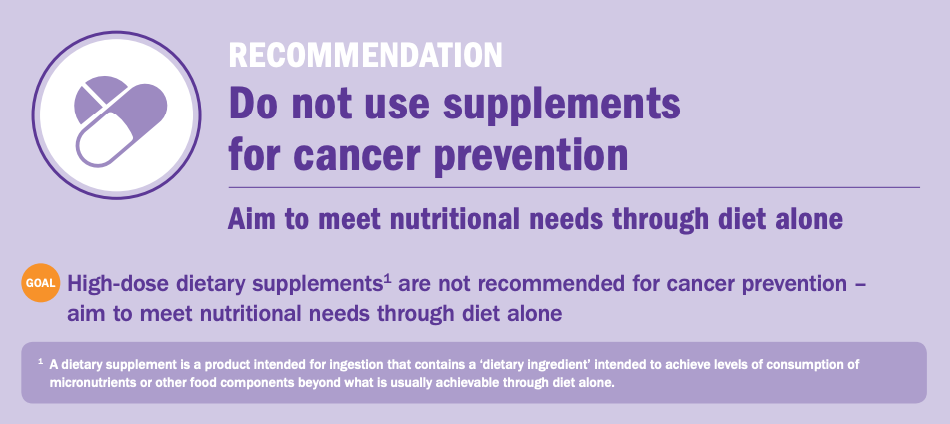
Source: WCRF - AICR Recommendations (2018)
Recommendation 8: DO NOT USE SUPPLEMENTS FOR CANCER PREVENTION
Aim to meet nutritional needs through diet alone.For most people, it is possible to obtain adequate nutrition from a healthy diet that includes the right foods and drinks.
The panel doesn't discourage the use of multivitamins or specific supplements for those sub-sections of the population who stand to benefit from them, such as women of childbearing age and the elderly. They simply caution against expecting any dietary supplement to lower cancer risk as well as a healthy diet can.
High-dose beta-carotene supplements have been linked to an increased risk for lung cancer in current and former smokers. It's always best to discuss any dietary supplement with your doctor or a registered dietitian.
Source: Summary of Cancer Prevention Recommendations (2018).
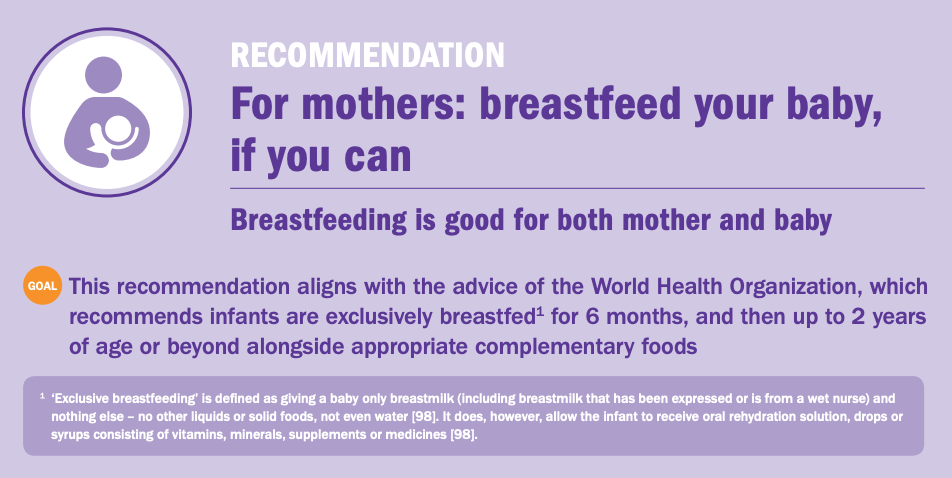
Source: WCRF - AICR Recommendations (2018)
Recommendation 9: [FOR MOTHERS] BREASTFEED YOUR BABY, IF YOU CAN
Breastfeeding is good for both mother and baby.According to the expert report, breastfeeding benefits both mother and child.
There is strong evidence that breastfeeding helps protect against breast cancer in the mother. There are likely two reasons for this. First, breastfeeding lowers the levels of some cancer-related hormones in the mother's body. Second, at the end of breastfeeding, the body gets rid of any cells in the breast that may have DNA damage.
In addition, babies who are breastfed are less likely to become overweight and obese. Overweight and obese children tend to remain overweight in adult life.
If you're planning to breastfeed your baby, your doctor or certified lactation consultant will be able to provide more information and support.
Source: Summary of Cancer Prevention Recommendations (2018).
Comments: How could breastfeeding reduce our cancer risk? Dr Greger has a video: The Wron Way To Detox (2 mins, 2012) that explains that we pass industrial pollutants from mom to infant via breast milk (!) Protecting Our Babies From Pollutants (2013) is an insightful article by Dr Greger. Another article by Dr Greger: Breastfeeding.
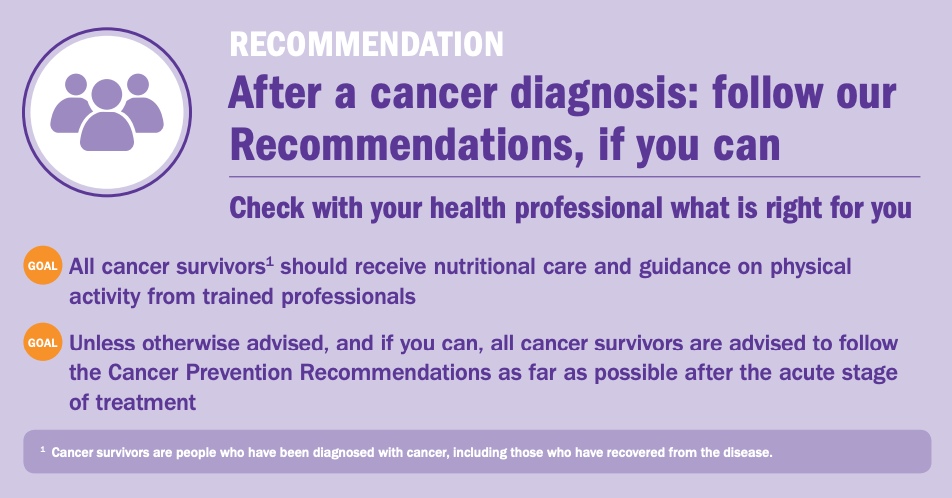
Source: WCRF - AICR Recommendations (2018)
Recommendation 10: AFTER A CANCER DIAGNOSIS, FOLLOW AICR RECOMMENDATIONS, IF YOU CAN
Check with your health professional about what is right for you.Anyone who has received a diagnosis of cancer should receive specialized nutritional advice from an appropriately trained professional. Once treatment has been completed, if you are able to do so (and unless otherwise advised), aim to follow AICR's cancer prevention recommendations for diet, physical activity and healthy weight maintenance.
Source: Summary of Cancer Prevention Recommendations (2018).

 Instagram
Instagram YouTube
YouTube